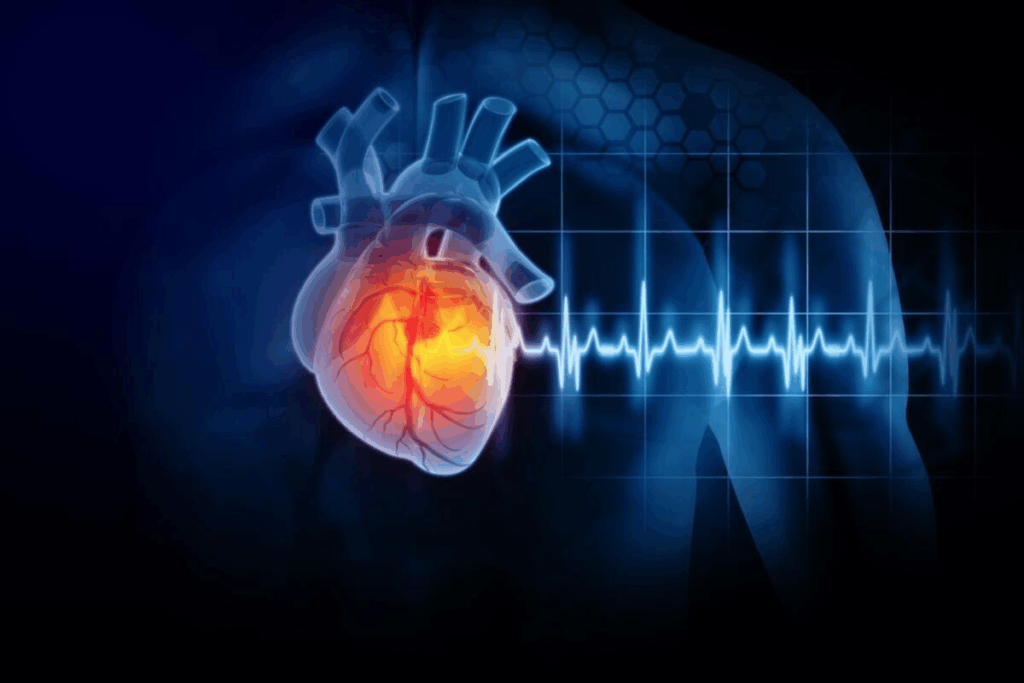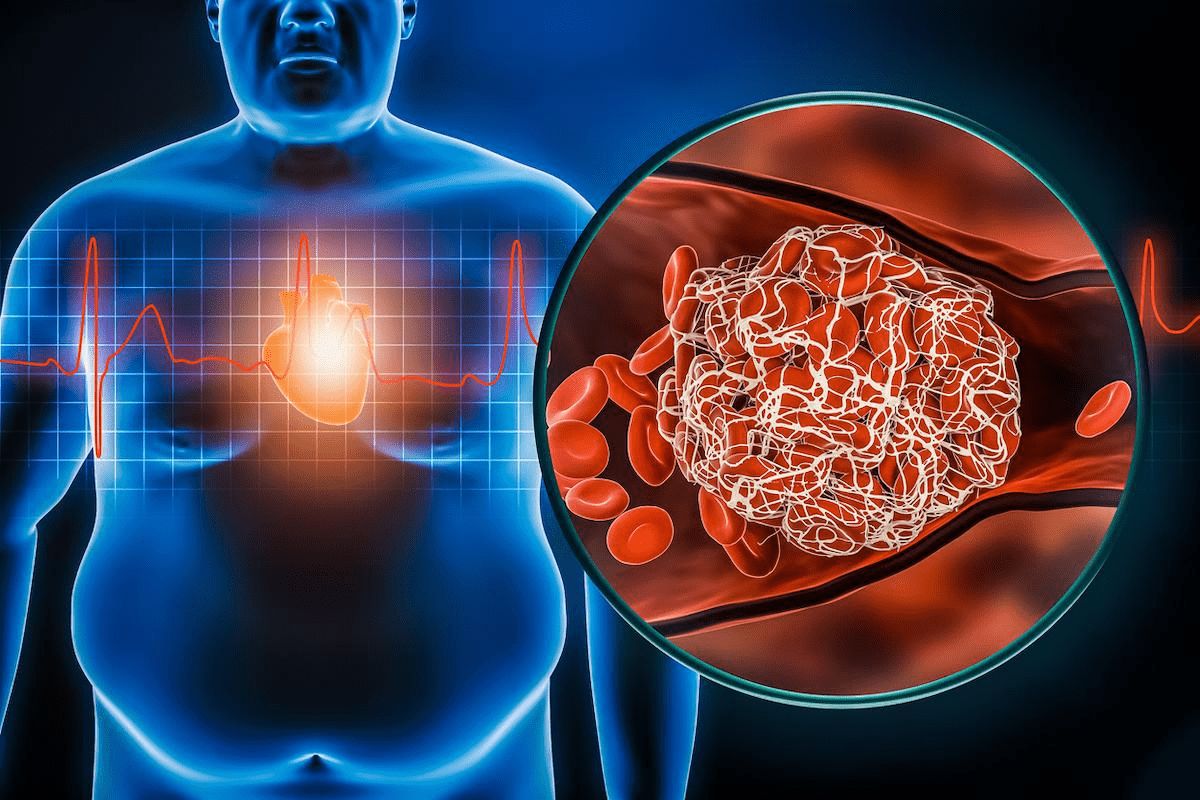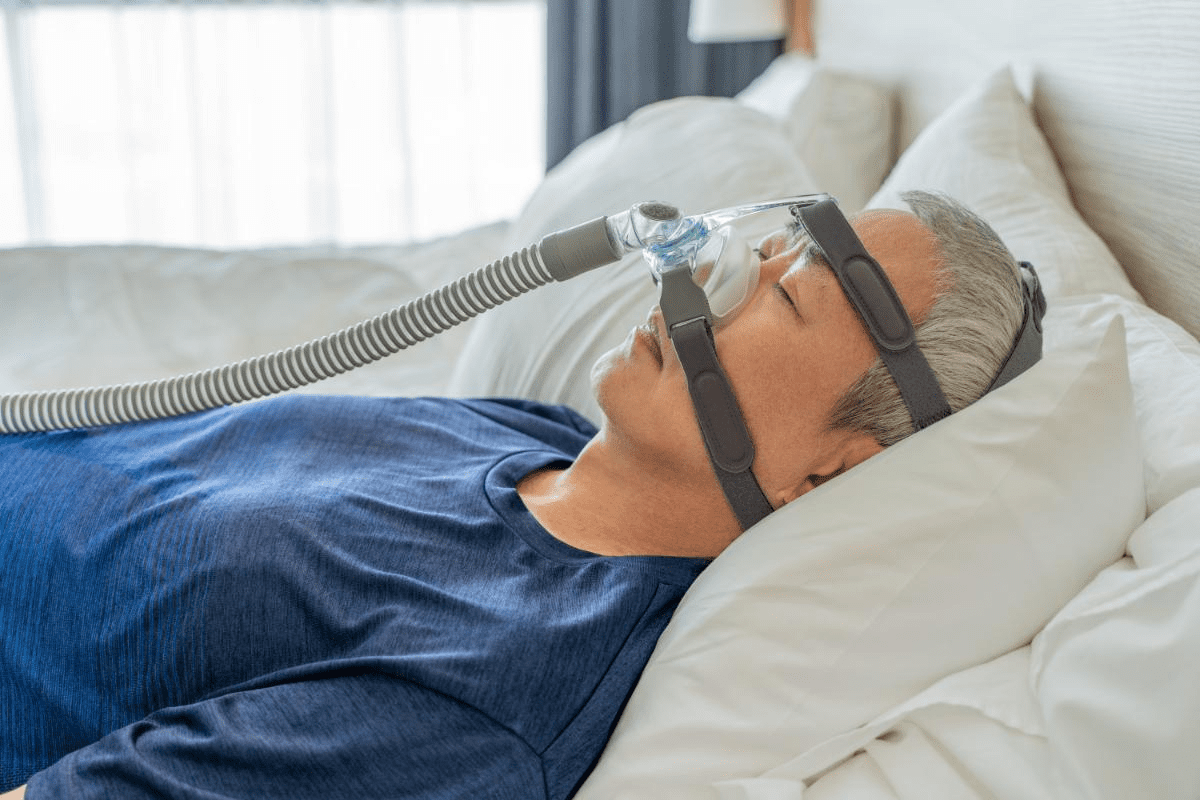Last Updated on November 27, 2025 by Ugurkan Demir

Sleep apnea is a serious condition that can harm your heart health. Studies show that people with untreated sleep apnea are at high risk of heart attack, stroke, and heart failure. How does sleep apnea affect the heart? Learn the mechanism of oxygen deprivation and blood pressure spikes that lead to heart disease.
At Liv Hospital, we focus on patient care based on the latest research. We help our patients understand how sleep apnea and heart disease are connected. This knowledge helps manage cardiovascular risks.
It’s important to know how sleep apnea affects the heart. By learning about this, we can prevent and treat heart problems better. This helps improve patient health outcomes.

It’s important to understand sleep apnea to protect our heart health. This sleep disorder can affect our heart in big ways. Knowing its types, how common it is, and what increases the risk is key.
Sleep apnea comes in two main types: Obstructive Sleep Apnea (OSA) and Central Sleep Apnea (CSA). Obstructive Sleep Apnea (OSA) happens when the airway gets blocked. Studies show that about 51% of people have OSA, showing how common it is.
Central Sleep Apnea (CSA) happens when the brain can’t tell the breathing muscles what to do. It’s less common but just as serious, often pointing to brain problems.
Many people have sleep apnea. About 34% of men and 17% of women have OSA. This shows how important it is to know about it and get checked.
Several things can make you more likely to get sleep apnea. These include:
A recent study found,
“The prevalence of sleep apnea is alarmingly high, and its impact on cardiovascular health cannot be overstated.”
Knowing these risk factors helps us catch sleep apnea early and treat it.
By understanding sleep apnea, we can find ways to protect our hearts. We can help those at risk and find better treatments.

Recent studies have shown a scary link between sleep apnea and heart health. Sleep apnea is more than a sleep issue; it’s a big risk for heart disease.
People with obstructive sleep apnea face a high risk of heart problems. 51% of those with sleep apnea have a high risk of heart disease. This shows how important it is to manage this condition.
Research found that 8.6% of sleep apnea patients have heart events or heart disease. This is very concerning and shows a strong connection between sleep apnea and heart health.
Condition | Prevalence | Cardiovascular Event Rate |
Sleep Apnea | 51% | 8.6% |
General Population | 5-10% | 2-3% |
Sleep apnea greatly raises the risk of heart problems. It makes the risk of heart failure go up by 140%, stroke by 60%, and coronary heart disease by 30%. These numbers show why treating sleep apnea is so important for heart health.
It’s key for doctors and patients to understand these numbers. They show the need for care that tackles sleep apnea’s effects on the heart.
Sleep apnea impacts heart health in several ways. It changes oxygen levels, affects the nervous system, and causes inflammation. Knowing these effects is key to understanding how sleep apnea harms the heart.
Intermittent hypoxemia is a major issue in sleep apnea. It means the blood often doesn’t get enough oxygen. This can cause oxidative stress and inflammation, harming the heart.
For every drop in blood oxygen, the risk of heart problems goes up by 45%. This shows how vital it is to treat sleep apnea to keep the heart safe.
Sleep apnea also turns on the sympathetic nervous system. This is like the “fight or flight” response. It makes the heart beat faster and blood pressure go up.
This repeated stress can damage the heart over time. It can lead to high blood pressure and other heart problems.
Also, sleep apnea causes inflammation and oxidative stress. These are big players in heart disease. Inflammation can make blood vessels worse, making them more likely to block.
These factors together raise the risk of heart disease. They can even lead to a heart attack.
The complex ways sleep apnea affects the heart show how serious it is. Understanding and tackling these issues can help lower heart disease risk. It’s important for better heart health.
It’s important to know how sleep apnea affects blood pressure for heart health. Sleep apnea happens when breathing stops or gets shallow while sleeping. It can cause blood pressure to go up and down.
Nocturnal blood pressure spikes are a big worry for those with sleep apnea. When sleep apnea happens, oxygen levels drop. This makes the body’s blood pressure go up, sometimes very high, like 250/150 mm Hg.
Nocturnal blood pressure spikes are a big worry for sleep apnea patients. These spikes happen when the body tries to get more oxygen by raising blood pressure. This can cause hypertension, or high blood pressure all the time.
Research shows many sleep apnea patients also have high blood pressure. About 36.2% of them have hypertension. Doctors need to watch blood pressure closely in these patients.
“The relationship between sleep apnea and hypertension is well-established, and understanding this connection is key to managing heart risks.”
Expert Opinion
Knowing how sleep apnea and high blood pressure are linked helps us manage heart risks. We should watch blood pressure closely, day and night. And we need to find ways to lower these risks.
Sleep apnea can change heart rate variability, leading to heart problems. It affects sleep quality and heart health deeply.
Heart rate variability (HRV) is the time difference between heartbeats. It shows how well the heart handles stress. Sleep apnea can lower HRV, making it harder for the body to handle stress.
Research shows sleep apnea patients have different HRV patterns. This can mean their heart rate and blood pressure go up. This puts extra strain on the heart.
Sleep apnea also raises the risk of arrhythmias, or irregular heartbeats. These can be dangerous. Low oxygen levels during sleep apnea can cause arrhythmias.
Studies link sleep apnea to arrhythmias like atrial fibrillation. Treating sleep apnea can lower the risk of these heart problems. It’s key to diagnose and treat sleep apnea.
Condition | Impact on Heart Rhythm | Potential Consequences |
Sleep Apnea | Reduced Heart Rate Variability | Increased Cardiovascular Stress |
Sleep Apnea | Increased Risk of Arrhythmias | Potential for Life-Threatening Events |
Untreated Sleep Apnea | Heightened Sympathetic Activity | Increased Heart Rate and Blood Pressure |
It’s important to know how sleep apnea affects the heart. Recognizing the risks helps prevent serious heart problems. Taking action can make a big difference in heart health.
Studies have found that sleep apnea greatly increases the risk of heart failure. This condition causes pauses or shallow breathing during sleep. It has a big impact on heart health.
Research shows sleep apnea raises heart failure risk by about 140%. This big jump is due to how sleep apnea affects the heart and blood system.
The reasons behind this link are complex. But, key factors include low oxygen levels, increased heart rate, and inflammation. These can all harm the heart and lead to failure.
The link between sleep apnea and heart failure involves several important pathways:
Knowing these mechanisms is key to finding effective treatments for sleep apnea patients.
Mechanism | Effect on Heart Health |
Intermittent Hypoxemia | Damage to heart muscle, increased risk of heart failure |
Sympathetic Nervous System Activation | Increased blood pressure and heart rate, cardiac stress |
Inflammation and Oxidative Stress | Chronic inflammation, deterioration of heart function |
By tackling sleep apnea and its causes, doctors can lower heart failure risk. This improves outcomes for those with this serious sleep disorder.
Research shows sleep apnea can raise stroke risk by 60%. This is due to several reasons linked to sleep apnea. Knowing these reasons helps lower stroke risk in sleep apnea patients.
Sleep apnea increases stroke risk through several ways. These include low oxygen levels, increased blood pressure, and inflammation. Low oxygen levels can damage blood vessels, raising stroke risk.
Sleep apnea also activates the sympathetic nervous system. This can lead to higher blood pressure and heart rate. High blood pressure is a major stroke risk factor, making blood pressure control key.
Knowing stroke symptoms is vital for quick action. Symptoms include sudden weakness, speech issues, and vision changes. Quick medical help is essential to lessen stroke damage.
To prevent stroke in sleep apnea patients, treat sleep apnea and manage blood pressure. A healthy lifestyle also helps. Treatments like CPAP therapy and lifestyle changes can lower stroke risk.
Understanding sleep apnea and stroke connection is important. Effective prevention strategies can reduce stroke risk in sleep apnea patients. Early sleep apnea diagnosis and treatment are vital for heart health and stroke prevention.
Sleep apnea is linked to a higher risk of coronary heart disease. We need to look into how sleep apnea impacts the heart. This can lead to more heart problems.
Research shows that sleep apnea raises the risk of heart disease by 30%. This is due to the lack of oxygen and disrupted sleep. These factors cause inflammation and damage to the heart’s lining.
Sleep apnea is more than just a sleep issue. It’s a major factor in heart problems. Early detection and treatment are key to preventing heart issues.
People with sleep apnea face a higher risk of angina and heart attack. The lack of oxygen during sleep can cause heart attacks. It’s important to watch for heart disease signs in sleep apnea patients.
Condition | Increased Risk | Complications |
Sleep Apnea | 30% increased risk of coronary heart disease | Angina, Heart Attack |
Coronary Heart Disease | – | Heart Failure, Arrhythmias |
Understanding the connection between sleep apnea and heart disease helps manage risks. Early treatment of sleep apnea can lower heart disease risks.
Sleep apnea is connected to several metabolic issues, like high cholesterol and diabetes. These problems greatly affect heart health. Looking into these complications shows how sleep apnea can raise the risk of heart disease.
Research shows that 66.1% of sleep apnea patients have high cholesterol. This is a big risk for heart disease. Sleep apnea and high cholesterol are linked through factors like low oxygen and poor sleep quality, causing bad cholesterol levels.
“The high rate of high cholesterol in sleep apnea patients highlights the need for a full approach to treatment,” says a sleep medicine expert.
Diabetes is common in sleep apnea patients, with a rate of 24.3%. Diabetes raises the risk of heart problems and makes sleep apnea harder to manage. It can lead to heart failure, artery disease, and stroke.
Understanding the metabolic issues linked to sleep apnea is key. We must manage sleep apnea, high cholesterol, and diabetes together. This includes lifestyle changes, medicine, and personalized care for each patient.
Getting a good diagnosis and treatment for sleep apnea can really help your heart. Sleep apnea not only messes with your sleep but also hurts your heart health. Knowing how to diagnose and treat it can help manage its effects on your heart.
First, doctors will ask about your medical history and do a physical check-up. Polysomnography (PSG) is the top way to find out if you have sleep apnea. This test records your brain, muscle, and heart activity while you sleep.
Home Sleep Apnea Testing (HSAT) is another tool. It’s easier to use at home. It tracks your sleep and oxygen levels. It’s not as detailed as PSG but can spot sleep apnea often.
Treating sleep apnea can make you sleep better and is good for your heart. The main treatment is Continuous Positive Airway Pressure (CPAP). CPAP keeps your airway open, cutting down on sleep disruptions and improving oxygen levels.
Oral appliances are another option. They move your jaw forward to keep your airway open. Changing your lifestyle, like losing weight and exercising, is also key in managing sleep apnea.
In serious cases, surgery might be needed. This could be to remove throat tissue or adjust your jaw. These steps can lower the risk of heart problems linked to sleep apnea, like high blood pressure and heart failure.
By tackling sleep apnea, we can safeguard our heart health and boost our overall health. If you think you might have sleep apnea, see a doctor to figure out the best treatment.
It’s key to understand how sleep apnea affects heart health. We’ve learned it can raise the risk of heart disease, heart failure, and stroke.
By treating sleep apnea, we can lower the risk of heart problems. This shows how vital it is to act against this sleep disorder. It helps keep the heart and overall health safe.
People with sleep apnea should team up with doctors to find a treatment plan. This might include changing lifestyle habits, using CPAP therapy, or other methods. Taking steps against sleep apnea is a big step towards heart health.
By focusing on treating sleep apnea, we can cut down on heart risks. It’s important to be proactive in managing sleep apnea to safeguard heart health.
Yes, sleep apnea is a big risk for heart disease. It causes breathing stops during sleep, stressing the heart. This stress can lead to inflammation and damage, increasing heart disease risk.
Yes, sleep apnea can raise heart attack risk. It affects the heart through breathing stops and stress. This can harm the heart and increase disease risk.
Sleep apnea harms the heart in several ways. It causes breathing stops, stress, and inflammation. These effects increase heart disease risk.
Yes, sleep apnea can lead to heart issues. It can cause arrhythmias, heart failure, and coronary disease. The breathing stops stress the heart, increasing disease risk.
Yes, sleep apnea can raise heart failure risk. It causes heart stress, inflammation, and damage. These effects can harm the heart and increase disease risk.
Yes, sleep apnea is linked to high blood pressure. The breathing stops can cause blood pressure spikes at night. This can lead to hypertension.
Yes, treating sleep apnea can lower heart disease risk. Proper treatment can reduce heart stress and inflammation. This can lower the risk of heart events.
Sleep apnea is linked to metabolic issues like high cholesterol and diabetes. These conditions can increase heart disease risk and lead to more heart events.
Sleep apnea can increase stroke risk. It causes inflammation, stress, and heart disease. The breathing stops can harm the heart and blood vessels, raising stroke risk.
Yes, sleep apnea can raise arrhythmia risk. The breathing stops can change heart rate and lead to arrhythmias.
Yes, sleep apnea can change heart rate. The breathing stops can cause heart rate to fluctuate. This can harm the heart and increase disease risk.
Subscribe to our e-newsletter to stay informed about the latest innovations in the world of health and exclusive offers!